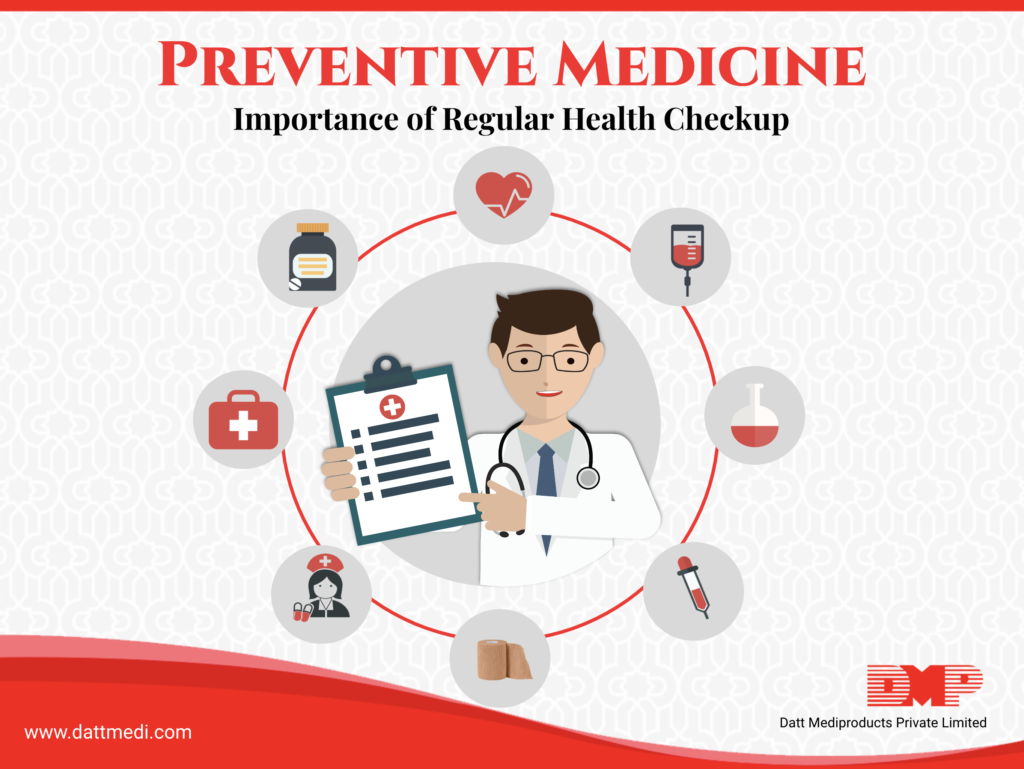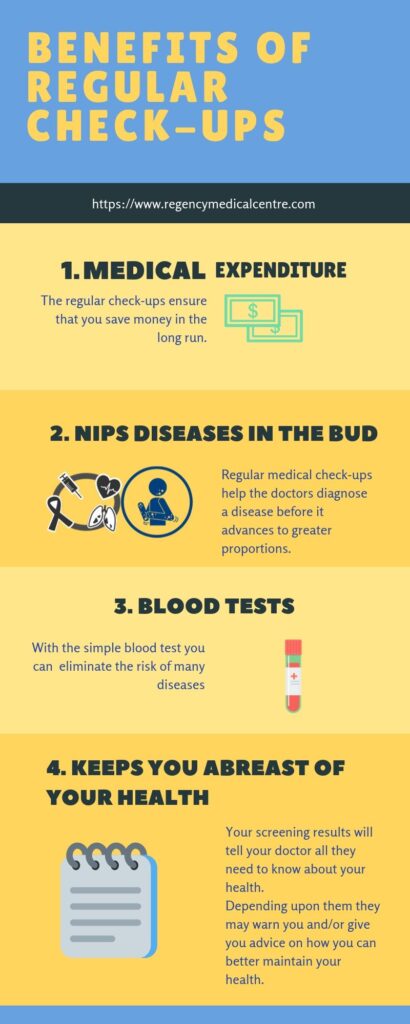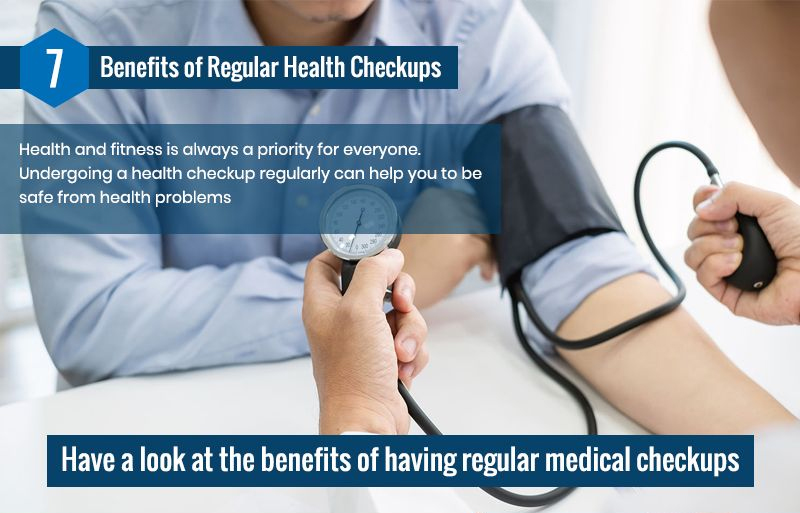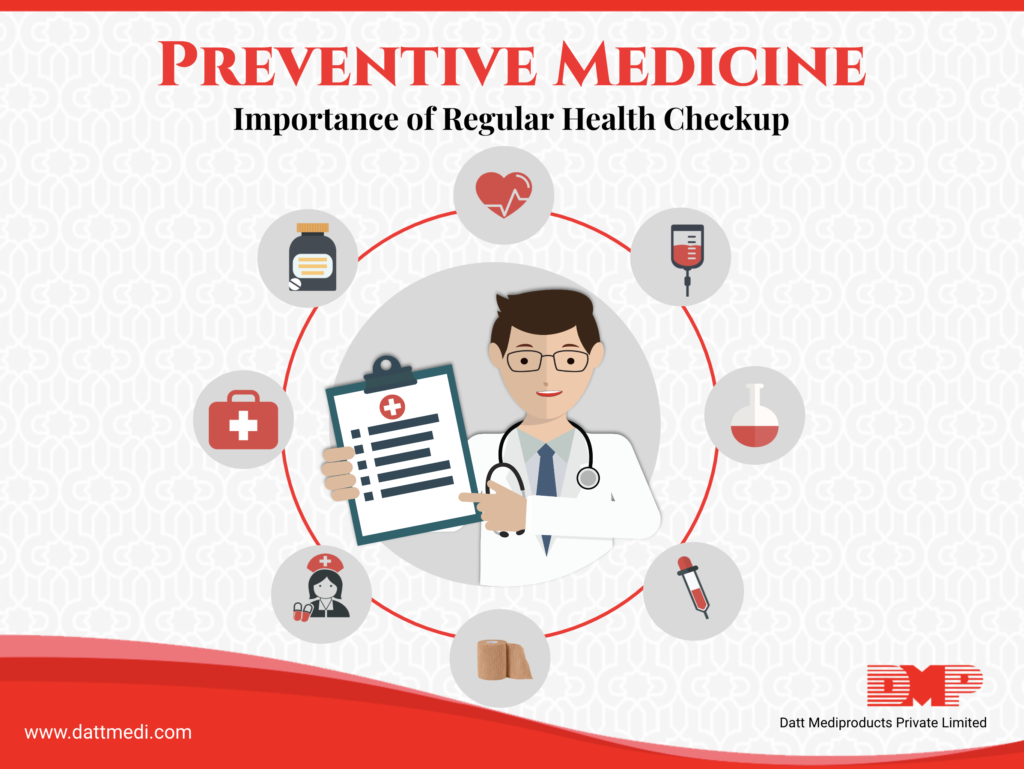
Maintaining good health is essential for a happy and fulfilled life, and a regular health check-up is key to achieving that. By keeping track of your overall well-being through routine check-ups, you can stay ahead of potential health issues and ensure timely intervention if necessary. Regular check-ups allow you to monitor your vital signs, assess your risk factors, and detect any underlying conditions that may not show symptoms yet. In this article, we will explore the significance of regular health check-ups and how they can empower you to take control of your health.
Early Detection of Diseases
Identify health problems before they become serious
Regular health check-ups play a crucial role in the early detection of diseases. By undergoing routine screenings and tests, you increase your chances of identifying potential health problems before they become serious. This allows for prompt medical intervention and treatment, potentially preventing the disease from progressing or causing further complications.
Screening for common diseases and conditions
Regular health check-ups encompass a range of screenings for common diseases and conditions. These screenings may include blood pressure measurements, cholesterol and glucose tests, cancer screenings, and assessments of various organ functions, among others. By undergoing these screenings regularly, you become more aware of your overall health status, enabling medical professionals to detect any potential issues at an early stage.
Increased chances of successful treatment
The early detection of diseases through regular health check-ups significantly improves the chances of successful treatment. By identifying conditions in their early stages, healthcare professionals can take prompt action and design appropriate treatment plans tailored to your specific needs. This proactive approach not only enhances the effectiveness of treatment but also increases the likelihood of a positive outcome and greater long-term health.
Preventive Healthcare
Prevention is better than cure
Regular health check-ups serve as a cornerstone of preventive healthcare. By taking a proactive approach to your well-being, you can identify and address potential health risks before they manifest as diseases. Preventive healthcare practices, such as immunizations, screenings, and lifestyle modifications, are aimed at reducing the incidence and severity of illnesses, ultimately minimizing the need for extensive treatment and reducing the overall healthcare burden.
Staying ahead of potential health risks
Health check-ups empower you to stay ahead of potential health risks. By engaging in regular assessments, screenings, and discussions with healthcare professionals, you can identify risk factors specific to your circumstances. Armed with this knowledge, you can make informed decisions regarding necessary lifestyle modifications, preventive measures, and treatment options to mitigate the risks and safeguard your well-being.
Developing personalized health plans
Regular health check-ups provide an excellent opportunity to develop personalized health plans. Through comprehensive assessments, healthcare professionals can tailor recommendations and interventions to address your specific health concerns and goals. These plans may include exercise and diet regimens, stress reduction techniques, and preventive measures tailored to your individual needs. By working closely with your healthcare team, you can take charge of your health and actively participate in the management of your well-being.

This image is property of www.regencymedicalcentre.com.
Monitoring Overall Health
Tracking changes in vital signs
Regular health check-ups enable the monitoring of vital signs, such as blood pressure, heart rate, and respiratory rate. By tracking these indicators over time, healthcare professionals gain insights into your overall health and can identify any changes that may require further investigation or intervention. Monitoring vital signs allows for the early identification of abnormalities, potentially indicating underlying medical conditions that may not yet be causing noticeable symptoms.
Evaluating overall well-being
Health check-ups are an opportunity for healthcare professionals to evaluate your overall well-being. They assess various aspects of your health, including physical, mental, and emotional well-being. By considering a holistic view of your health, professionals are better equipped to identify potential concerns and offer guidance on maintaining and improving your well-being.
Maintaining a baseline for future reference
Regular health check-ups establish a baseline for future reference. By consistently monitoring your health, healthcare professionals can track any changes or trends that may indicate the progression of a disease or the effectiveness of a treatment plan. Having a baseline enables accurate comparisons, allowing for better interpretation of test results and the identification of specific areas of concern that may require further investigation or treatment.
Detection of Silent Diseases
Detecting diseases with no visible symptoms
Regular health check-ups are instrumental in detecting silent diseases, often characterized by a lack of apparent symptoms. Conditions such as high blood pressure, diabetes, certain cancers, and chronic kidney disease can progress silently, causing significant damage before symptoms emerge. By undergoing routine screenings and tests, healthcare professionals can detect these silent diseases early, allowing for timely intervention and the prevention of further complications.
Detecting conditions that affect internal organs
Many diseases and conditions affect internal organs, making their early detection challenging without specialized screenings. Regular health check-ups often include tests and assessments specifically designed to detect these conditions. For instance, liver function tests, kidney function tests, and imaging studies can identify potential issues with these vital organs. Detecting such conditions at an early stage enhances the effectiveness of treatment and reduces the risk of long-term complications.
Taking necessary actions to prevent complications
Early detection of silent diseases through health check-ups enables timely interventions to prevent complications. By identifying potential health concerns, healthcare professionals can suggest lifestyle modifications, prescribe medications, or recommend other treatments to address the underlying conditions and prevent further problems. This proactive approach can significantly reduce the risk of complications, improving overall health outcomes and enhancing the quality of life.

This image is property of www.coolangattamedicalcentre.com.
Health Education and Guidance
Receive expert advice from healthcare professionals
Regular health check-ups provide an opportunity to receive expert advice and guidance from healthcare professionals. These experts can educate you about various aspects of your health, such as disease prevention, healthy lifestyle choices, and self-care practices. By leveraging their expertise, you can make informed decisions and take proactive steps towards optimizing your health and well-being.
Learning about healthy lifestyle choices
Health check-ups often involve discussions about healthy lifestyle choices. Healthcare professionals can offer guidance on exercise routines, nutritional recommendations, stress management techniques, and strategies for maintaining a work-life balance. By learning about these healthy choices, you are empowered to make positive changes, improving your overall health and reducing the risk of chronic diseases.
Educating oneself about specific health concerns
Regular health check-ups enable you to educate yourself about specific health concerns that may affect you. Whether it’s a family history of a particular condition or a personal risk factor, understanding the implications of these factors is crucial. Through discussions with healthcare professionals during check-ups, you can gain valuable insights into these concerns, enabling you to make informed decisions and actively participate in your own healthcare.
Managing Chronic Conditions
Monitoring progress and disease management
For individuals with chronic conditions, regular health check-ups are essential for monitoring their progress and managing their diseases effectively. By tracking indicators such as blood sugar levels, blood pressure, and symptom severity, healthcare professionals can evaluate the effectiveness of the current treatment plan and make adjustments as necessary. Regular check-ups provide an opportunity to address any challenges or concerns faced by individuals with chronic conditions, ensuring optimal disease management and improved quality of life.
Adjusting treatment plans as required
Health check-ups offer a platform for healthcare professionals to assess and adjust treatment plans for chronic conditions. As individual needs and circumstances may change over time, regular evaluations become crucial in ensuring that treatment plans remain effective and up to date. By discussing any concerns or changes in symptoms during check-ups, individuals with chronic conditions can actively participate in the management of their health and contribute to the optimization of their treatment strategies.
Promoting healthy living with chronic conditions
Regular health check-ups for individuals with chronic conditions provide an opportunity to promote healthy living. By engaging in discussions about lifestyle modifications, symptom management, and psychological support, healthcare professionals can empower individuals to lead fulfilling lives despite their chronic conditions. By addressing physical, emotional, and social aspects of their well-being during check-ups, individuals can gain the necessary tools and support to navigate their conditions and maintain a high quality of life.

This image is property of mypvhc.com.
Assessing Risk Factors
Evaluating personal risk factors for specific diseases
During health check-ups, healthcare professionals assess personal risk factors for specific diseases. These risk factors can include age, family history, lifestyle choices, and underlying health conditions. By evaluating these factors, healthcare professionals can identify potential areas of concern and provide targeted guidance on risk mitigation strategies. This personalized approach allows individuals to take proactive steps towards reducing their risk and improving their health outcomes.
Identifying necessary lifestyle modifications
By assessing risk factors, health check-ups enable the identification of necessary lifestyle modifications. For example, if an individual is at high risk for cardiovascular disease due to factors such as obesity, high blood pressure, or a sedentary lifestyle, healthcare professionals can recommend exercise regimens and dietary changes to mitigate these risks. Identifying necessary lifestyle modifications empowers individuals to take ownership of their health and make positive changes that can significantly impact their overall well-being.
Taking proactive steps to mitigate risks
Regular health check-ups offer individuals the opportunity to take proactive steps to mitigate their risks. By assessing risk factors, healthcare professionals can provide guidance on preventive measures, such as regular screenings, vaccinations, or behavior modifications. By implementing these recommendations and actively participating in their healthcare, individuals can reduce their risk of developing certain diseases and improve their overall health and longevity.
Stress Management
Evaluating the impact of stress on overall health
Health check-ups provide a platform to evaluate the impact of stress on overall health. Chronic stress can have detrimental effects on physical and mental well-being, contributing to conditions such as high blood pressure, cardiovascular disease, anxiety, and depression. During health check-ups, healthcare professionals can assess the individual’s stress levels and discuss strategies for stress reduction. By addressing the impact of stress, individuals can enhance their overall health and well-being.
Receiving recommendations for stress reduction techniques
Regular health check-ups allow individuals to receive recommendations for stress reduction techniques. Healthcare professionals can provide guidance on relaxation exercises, mindfulness strategies, and other stress management techniques. By incorporating these techniques into their daily routines, individuals can effectively manage stress levels, reduce the risk of stress-related health problems, and improve their overall quality of life.
Promoting mental and emotional well-being
Health check-ups serve as an opportunity to promote mental and emotional well-being. By discussing concerns, challenges, and sources of stress during check-ups, individuals can receive the necessary support and guidance to address these issues. Healthcare professionals can recommend counseling services, support groups, or other resources that can help individuals navigate their emotional and mental well-being. By prioritizing mental and emotional health during check-ups, individuals can enhance their overall well-being and lead more fulfilling lives.

This image is property of www.coolangattamedicalcentre.com.
Maintaining a Healthy Lifestyle
Encouraging regular exercise and physical activity
Health check-ups play a vital role in encouraging regular exercise and physical activity. During check-ups, healthcare professionals can assess an individual’s current activity levels, discuss the benefits of exercise, and offer recommendations tailored to their needs and abilities. By emphasizing the importance of physical activity, individuals are motivated to incorporate exercise into their daily routines, leading to improved cardiovascular health, weight management, and overall well-being.
Promoting balanced nutrition and healthy eating habits
Regular health check-ups promote balanced nutrition and healthy eating habits. Healthcare professionals can provide guidance on dietary choices, portion control, and meal planning. By educating individuals on the importance of a nutritious diet and addressing any specific dietary needs or restrictions, individuals can make informed choices that support their overall health and prevent chronic diseases such as obesity, diabetes, and cardiovascular disease.
Monitoring weight and body composition
Health check-ups provide opportunities to monitor weight and body composition. By regularly assessing weight, body mass index (BMI), and body composition, healthcare professionals can track any changes that may require intervention or adjustments in lifestyle choices. Monitoring weight and body composition allows individuals to proactively manage their weight, understand the impact on overall health, and make informed decisions about nutrition and exercise to maintain a healthy body.
Establishing a Long-term Doctor-patient Relationship
Building trust and rapport with healthcare providers
One of the significant benefits of regular health check-ups is the establishment of a long-term doctor-patient relationship. By consistently visiting the same healthcare provider, individuals can build trust, rapport, and familiarity. This relationship enhances communication, allows for a more comprehensive understanding of an individual’s health history, and facilitates better continuity of care.
Understanding individual health goals and concerns
Regular health check-ups enable healthcare professionals to understand individual health goals and concerns. By discussing personal aspirations and health-related challenges during check-ups, individuals can expect tailored guidance and support. Healthcare professionals can provide advice and resources aligned with an individual’s unique circumstances, empowering them to make decisions that positively impact their health and well-being.
Building a comprehensive medical history
Over time, regular health check-ups contribute to building a comprehensive medical history. By consistently documenting an individual’s health status, test results, and discussions, healthcare professionals can gain a holistic understanding of their health journey. This comprehensive medical history aids in accurate diagnoses, treatment planning, and ensuring appropriate care based on an individual’s unique health needs.
In conclusion, regular health check-ups play a vital role in maintaining optimal health and well-being. From early disease detection and preventive healthcare to monitoring overall health and managing chronic conditions, health check-ups offer numerous advantages. By emphasizing the importance of early detection, preventive measures, and personalized care, these check-ups empower individuals to take an active role in their health, fostering improved outcomes and a higher quality of life. So, make regular health check-ups a priority and invest in your long-term well-being.

This image is property of dattmedi.com.